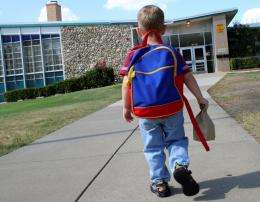Coping with back-to-school anxiety

Many children feel nervous about going to school for the first time or returning to school after a summer off. Here are tips for kids – and parents – on managing the back-to-school jitters.
On your child’s first day of school, he or she may worry about getting lost. Or that it will be hard to find a locker. That the new teacher will be mean. Or that something will happen to Mom or Dad during school.
Such anxieties are normal and common among children, said Karen Poulos, MD, an associate professor of psychiatry and director of the child and adolescent psychiatry residency program at the University of North Carolina at Chapel Hill School of Medicine.
“With a new school year, it’s a time of excitement and anticipation, but it can be very stressful,” she said.
More than 55 million American students will enroll in elementary through high schools this fall, according to the U.S. National Center for Education Statistics.
For the first time-students among them, Poulos recommends taking a tour of the school before class begins. Many elementary and middle schools offer opportunities for children and their caretakers to visit. During that time, you and your child can meet the teacher, get a schedule, walk through the school and practice using a locker.
With young children, you can practice the school day’s entire routine – from waiting for the bus to the pick-up from school – so that everything becomes as familiar as possible, Poulos said.
If your child has spent most of his or time this summer playing alone or with family members, schedule some play dates. That will help him or her get back into the social groove.
You can also talk with your child about his or her worries for the first day of school. Ask questions such as, “What have you heard about kindergarten?” “What do you think it’s going to be like?” “Do your friends have any worries about kindergarten?” Then, you can talk about those worries one by one, helping your child to separate realistic fears from unrealistic ones.
Once school begins, you can continue this conversation by checking in with your child on a regular basis, Poulos said. The conversations should happen in a safe place at a routine time, such as during afternoon snack or after dinner.
Finally, don’t forget that parents can feel stress about the first day of school, too. When children notice their parents feeling nervous, they may become anxious, too. So try to remain calm and positive, Poulos said. If you find yourself worrying, take a break to talk to another adult.
When anxiety becomes severe
In some cases, strong anxiety may interfere with a child’s happiness or learning. About one in eight children suffer from an anxiety disorder, according to the Anxiety Disorders Association of America.
You may notice that your child has frequent temper tantrums, suffers from nightmares or expresses a strong refusal to go to school. Children may also say they feel sick every Monday morning – physical complaints are often a sign of worry.
In those cases, it’s time to call in reinforcements, Poulos said. First, if your child is complaining of physical symptoms, then have him or her seen by a pediatrician to make sure that you’re not overlooking an illness. Then, talk to your child’s teacher, the school counselor or psychologist. They’ll be able to lend added to support to your child, perhaps discovering any underlying social, emotional or academic problems.
Meanwhile, you’ll need to play the part of a detective. Have gentle, ongoing conversations with your child about what he or she is worried about or what “friends” might be afraid of, Poulos said (It’s often easier for a child to talk about a friend than his or her own fears.)
If you discover that your child is a bully or is being bullied, you should take action immediately. Hold a meeting with your child’s teachers and counselors to gain a full understanding of what is going on and to develop a plan of action.
“Bullying shouldn’t be dismissed,” Poulos said. “It’s not a rite of childhood. It’s not normal.”















